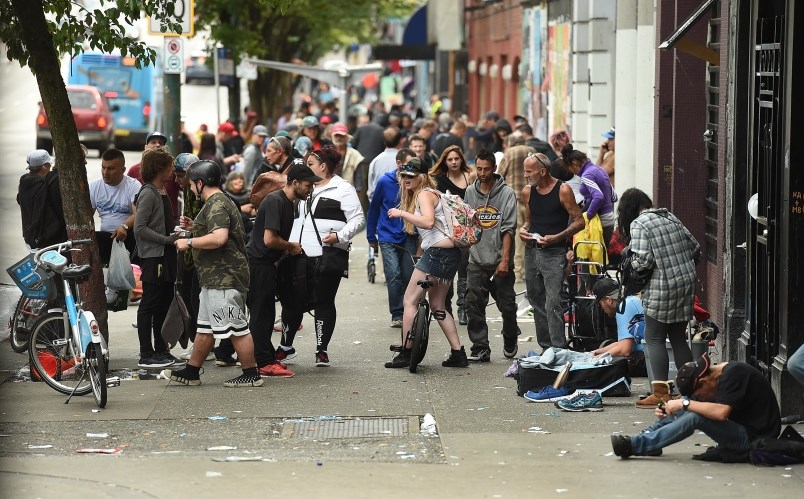Back in September, former Musqueam Indian Band chief Wendy John with her concerns about the drug-fueled mayhem in the Downtown Eastside and its connection to the band’s reserve in southwest Vancouver.
“The young people here are getting caught up in places in the Downtown Eastside, and what they’re doing is they’re bringing the Downtown Eastside here,” John said.
John made that comment at the beginning of a Â鶹´«Ã½Ó³»Police Board meeting held at the band’s cultural pavilion. John is the newest member of the police board.
In her speech, John said the band still has high rates of alcoholism, drug addiction and problems with violence. Two hundred band members are also on a waiting list to get housing, she said.
It is those comments that came to mind in reading a recent court decision concerning a 26-year-old Musqueam band member named Thomas Joseph Lloyd Brown.
Police arrested him in February 2018 in the Downtown Eastside. He later pleaded guilty to possession of 1.03 grams of fentanyl for the purpose of trafficking. He’s now in prison.
His story is in this space in August about 37-year-old Michael Richard Rousseau, another Indigenous man caught up in crime in Vancouver.
They both had chaotic childhoods. They both have Grade 9 educations. They both have been arrested multiple times.
Coincidentally, the same judge — Reginald P. Harris — presided in both cases and made it clear neither man got a great start in life, with their Indigenous heritage a factor in their struggles.
Harris on Brown: “In fact, a review of his background and history strongly suggests that he was doomed to face significant struggles even before his birth. Specifically, the historical mistreatment of Indigenous persons placed Mr. Brown on the roadway to criminal involvement and even gave him a push.”
Brown’s pre-sentencing report notes he was drinking large quantities of alcohol and smoking marijuana on a daily basis with friends and cousins since he was 15 years old.
“He indicated that ‘everybody on the reserve drinks’ and he frequently witnessed fights and violence starting at a young age,” the report said.
“Mr. Brown informs that his mother, maternal uncle and aunt had longstanding issues with drug addiction that resulted in overdoses and his grandmother is a heavy drinker. He adds that his father’s side of the family regularly used alcohol and marijuana.”
Brown’s parents separated when he was two years old. His father is a residential school survivor. His mother, who “worked the streets” in the Downtown Eastside, died of a drug overdose in 2014.
It is drugs, as mentioned, that put Brown in jail.
The Crown wanted him to serve three to four years in prison, whereas his lawyer argued for a lesser sentence of 24 months, less the time he had already served in jail.
Brown was on probation at the time of his arrest, and has four previous convictions for selling drugs.
In the end, Harris sentenced Brown to 30 months and credited him with 630 days for time already served.
In sentencing, Harris pointed out the effect colonialism has had on Brown and his disconnection to Indigenous culture, despite his family having lived on the Musqueam reserve for generations.
“At first blush, it may appear that Mr. Brown has a high degree of moral culpability,” he wrote.
“However, such a conclusion ignores Mr. Brown’s Indigenous background and the impact of colonialism. In this regard, Mr. Brown, his family and his community have suffered substance abuse, violence, low level of education, poverty and disconnection from culture, tradition, role models and community.”
Harris concluded: “For these reasons, I conclude that Mr. Brown’s level of moral culpability is toward the low end of the spectrum.”
He added that such a sentence would minimize the separation of Brown from his family and reserve, where he has helped his cousin operate a fishing boat.
“I see this approach as a means to support his connectedness to his culture which, in the long term, would have a rehabilitative benefit,” he wrote, noting he has the support of his father.
Harris didn’t mention it in , but it is a fact that Indigenous men are overrepresented in the nation’s prisons and in homeless counts.
Why?
The stories of Brown and Rousseau — who once lived on the streets, was beaten, raped, burned with cigarettes and has been diagnosed with Hepatitis C, ADHD, anxiety, depression and PTSD — provide a sad glimpse.
@Howellings
Read more from the





